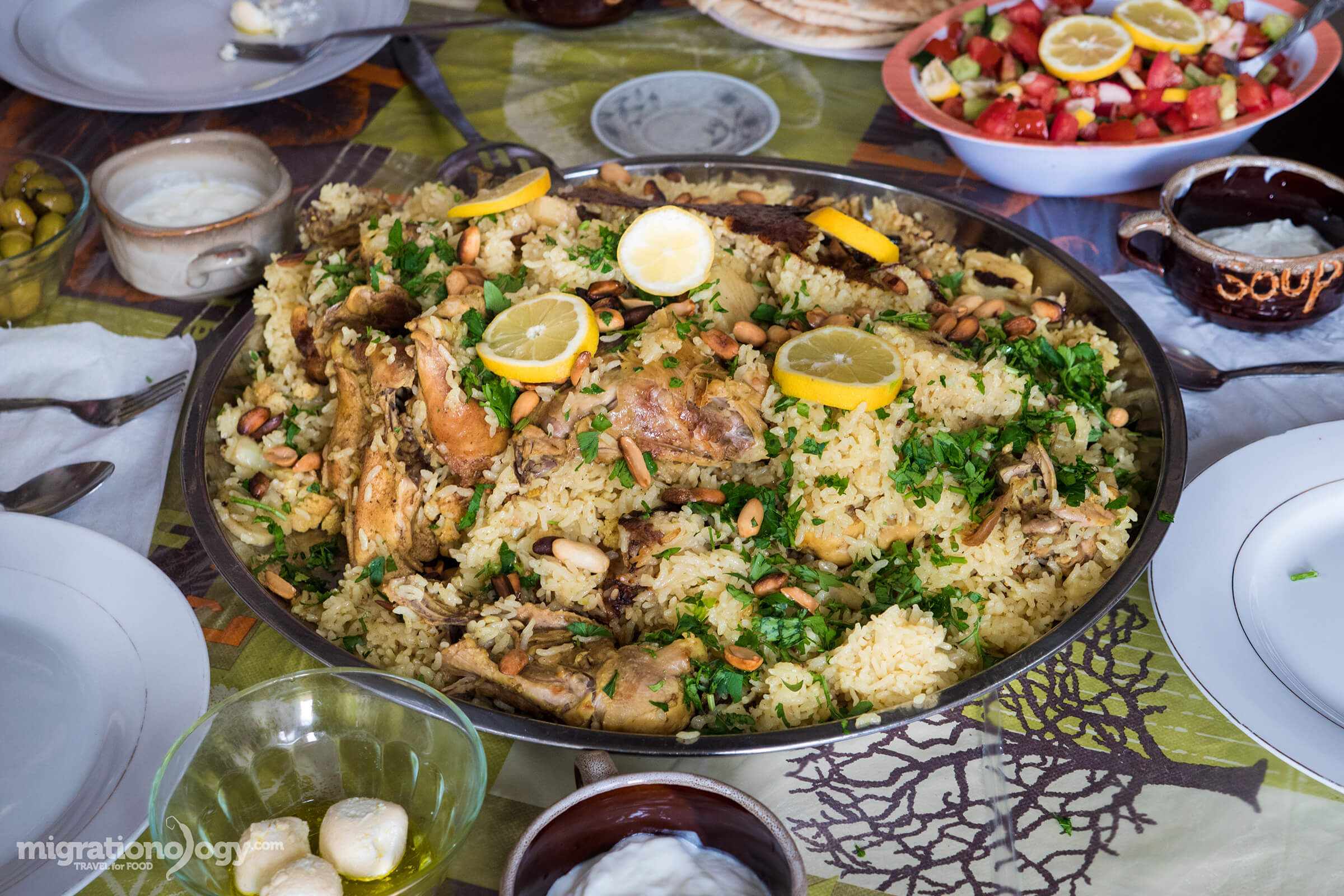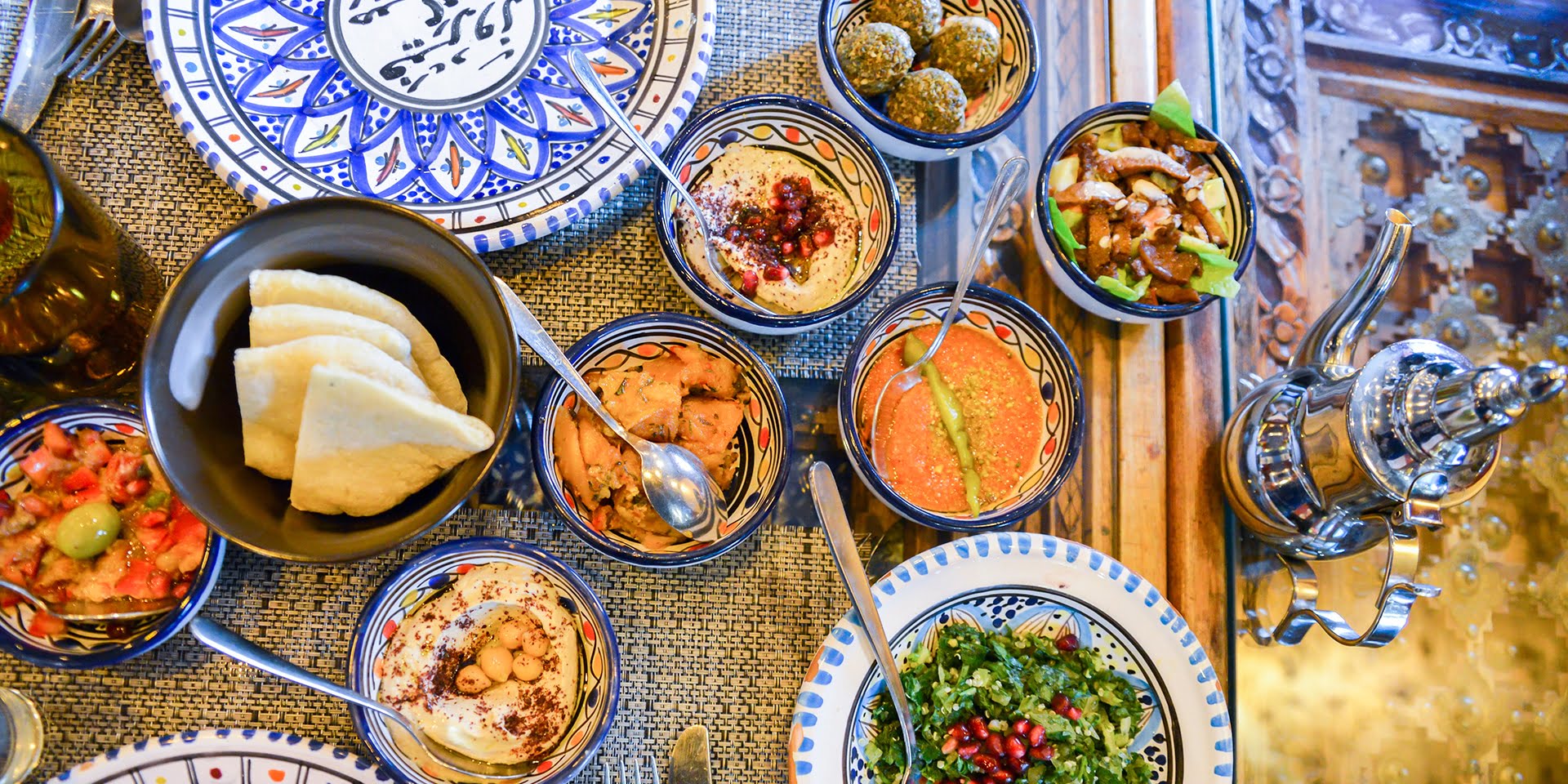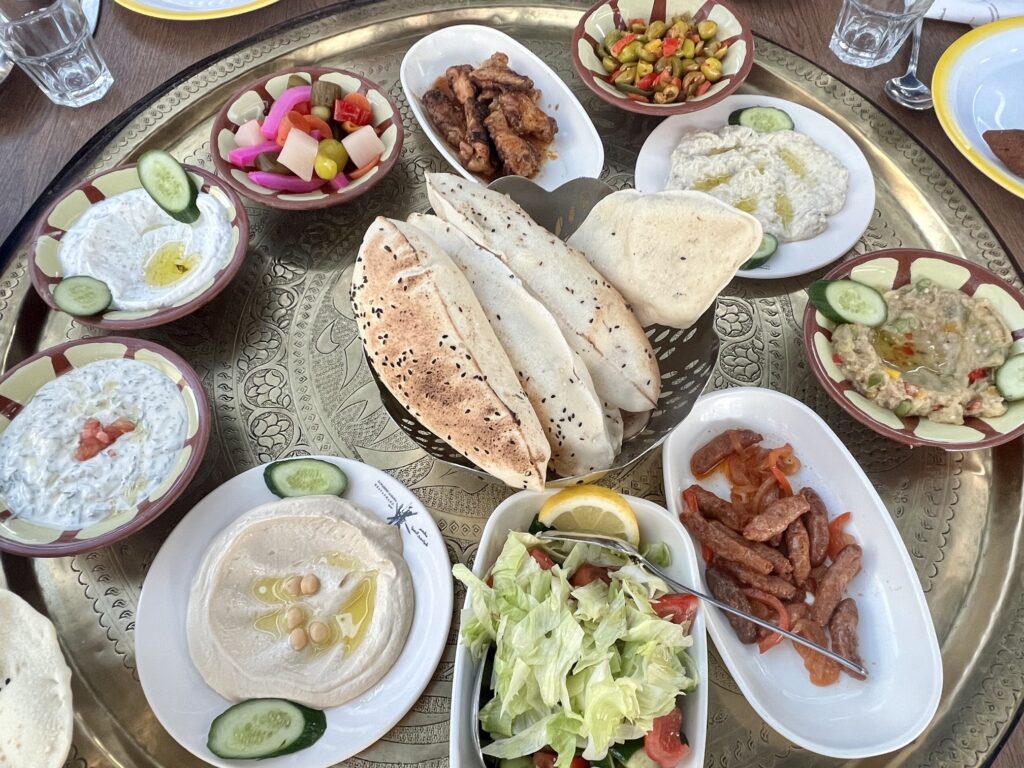Jordanian Cuisine Unveiled: A Food Lover's Ultimate Handbook

Introduction
Overview of Jordanian Cuisine
Jordanian cuisine is a delightful tapestry of flavours, textures, and traditions that reflect the country's rich history and cultural diversity. It showcases a blend of Bedouin, Levantine, and Mediterranean influences, resulting in a culinary experience that is both comforting and innovative.
Traditional ingredients like lamb, chicken, grains, and an array of aromatic spices play pivotal roles in many dishes. When you stroll through the streets of Amman, the tantalising aromas wafting from food stalls are sure to pique your curiosity.
Common staples include:
- Mansaf: The national dish, featuring lamb cooked in a unique fermented yogurt sauce.
- Maqluba: A beloved upside-down rice dish that surprises with every bite.
- Falafel and Hummus: Quick bites that reveal just how versatile chickpeas can be.
Significance of Jordanian Culinary Heritage
The culinary heritage of Jordan is essential for understanding its culture and traditions. Food is a key part of Jordanian hospitality, often serving as a means to bond with family and friends. Gathering around a platter of shared dishes doesn’t just nourish the body; it nurtures the spirit.
Key points include:
- Food as a social connector, bringing communities together.
- The preservation of traditional recipes that have been passed down through generations.
- A representation of cultural identity, reflecting the life and warmth of the Jordanian people.
As you explore Jordanian cuisine, you'll not only indulge your taste buds but also connect with a rich heritage that is both inviting and vibrant.

Traditional Jordanian Dishes
Mansaf: The National Dish of Jordan
When it comes to traditional Jordanian dishes, Mansaf reigns supreme as the national dish, embodying the very essence of Jordanian hospitality. This sumptuous meal consists of tender lamb cooked in a creamy yoghurt sauce known as jameed and is served over a bed of fragrant rice. Typically, Mansaf is enjoyed communally, where diners gather around a large platter and share the meal by hand—a beautiful tradition that invokes camaraderie.
Key features of Mansaf:
- Flavorful: The unique combination of lamb and yoghurt creates a rich taste.
- Cultural Symbol: Often served during celebrations and gatherings, it signifies hospitality and generosity.
Falafel and Hummus: Popular Street Food Classics
You cannot discuss Jordanian cuisine without mentioning falafel and hummus. These iconic street food classics are not just tasty; they’re also staples that cater to both locals and visitors alike. Crispy falafel, made from ground chickpeas and spices, offers a satisfying crunch perfect for lunch. Pair it with a generous dollop of hummus, and you have a delightful experience on your hands.
Highlights include:
- Quick and Tasty: Ideal for a grab-and-go meal while exploring the vibrant streets.
- Vegetarian-Friendly: These dishes cater to various dietary preferences.
Maqluba: A Flavorful Upside-Down Dish
Finally, let’s not forget Maqluba, an iconic upside-down rice dish that takes centre stage at many Jordanian tables. This hearty meal combines rice, vegetables, and your choice of meat (often chicken or lamb) cooked together in a pot. Once fully cooked, it is flipped onto a platter, revealing a beautiful layered effect that excites anyone seeing it for the first time.
Why you’ll love Maqluba:
- Artful Presentation: It’s as pleasing to the eyes as it is to the palate.
- Variety of flavours: Each mouthful offers a unique combination of ingredients.
With these traditional dishes, you’ll find that Jordanian cuisine not only fills the stomach but also feeds the soul.
Key Ingredients in Jordanian Cooking
Sumac: The Tangy Spice Staple
As we delve deeper into what makes Jordanian cuisine exceptional, one ingredient that stands out is sumac, a tangy spice with a vibrant purple hue. Often sprinkled atop dishes, sumac adds a refreshing citrusy zing that elevates the flavours of meats, salads, and even dips.
Why Sumac is a must-have:
- Versatile Use: It's fantastic on grilled meats and salads, providing a unique twist.
- Health Benefits: Rich in antioxidants, sumac is a great addition to a balanced diet.
Olive Oil: A Fundamental Component
No Jordanian kitchen is complete without olive oil. This liquid gold is not only used for cooking but is also drizzled on dishes to enhance their aroma and flavour. Its rich taste complements many recipes, from salads to marinades, making it a kitchen staple.
Reasons to love olive oil:
- Heart-Healthy: It’s loaded with healthy fats that benefit cardiovascular health.
- Culinary Tradition: In Jordan, using high-quality olive oil is a proud tradition passed down through generations.
Za'atar: The Aromatic Herb Blend
Last but certainly not least is za'atar, an aromatic herb blend that epitomises Middle Eastern cuisine. Composed of thyme, sesame seeds, sumac, and salt, za'atar adds depth to dishes whether sprinkled on flatbreads, mixed into dips, or used as a seasoning for meats.
Za'atar delights include:
- Endless Possibilities: Perfect for enhancing dips, salads, and even roasted vegetables.
- Cultural Richness: Za'atar has historical significance in Jordan, representing community and tradition.
Together, these key ingredients create a vivid palette of flavours that are celebrated in Jordanian cooking, making each meal an experience to cherish.

Influences on Jordanian Cuisine
Bedouin Influence on Culinary Traditions
The landscape of Jordanian cuisine is largely shaped by the Bedouin culture, which has nourished its culinary traditions for centuries. Bedouin cooking is centred around simple yet robust flavours, often featuring slow-cooked meats and hearty grains. Dishes like Mansaf truly reflect this heritage, showcasing methods of preparation passed down through generations.
Notable Bedouin influences include:
- Cooking Methods: Traditional techniques such as cooking in underground ovens or over open flames.
- Ingredients: A reliance on local produce and livestock, resulting in fresh, seasonal dishes.
Levantine and Mediterranean Fusion
Jordan's geographic position makes it a crossroads of Levantine and Mediterranean influences. This fusion is evident in the use of ingredients like olive oil, fresh herbs, and citrus, which are staples in both cuisines.
Highlights of this fusion:
- Diverse Flavours: Dishes combine varied spices and ingredients that cater to a wide palate.
- Shared Culinary Practices: Many dishes, such as hummus and tabbouleh, are enjoyed throughout the Levant, but each region adds its unique twist.
Ottoman Legacy in Jordanian Food Culture
The Ottoman Empire left a significant mark on Jordanian food culture, introducing various techniques and ingredients that enriched the local cuisine. From the emphasis on sweet pastries to intricate rice dishes, this influence is still palpable today.
Key contributions of the Ottoman legacy:
- Complex Flavours: The use of spices like cinnamon and nuts in both savoury and sweet dishes.
- Culinary Techniques: The preparation of intricate dishes that showcase the artistry of cooking.
These rich influences weave together to create a vibrant tapestry of Jordanian cuisine, reflecting its diverse history while celebrating the flavours that make it unique.
Dining Etiquette and Customs in Jordan
Importance of Hospitality in Jordanian Culture
In Jordan, hospitality is not just a cultural norm; it's a way of life. When you’re invited into a Jordanian home, be prepared for warm welcomes and generous spreads. Guests are treated with utmost respect, which often manifests in an abundance of food—enough to make anyone feel like royalty!
Key aspects of hospitality in Jordan:
- Serving First: Hosts typically serve guests before themselves, showcasing their dedication to welcoming newcomers.
- Abundant Offerings: Expect a big meal with multiple courses, from aromatic dishes to tempting desserts.
Traditional Dining Rituals and Customs
Dining customs in Jordan come with their own unique flair that adds to the experience. One of the most cherished traditions is eating with your hands, specifically the right hand, which is seen as a way to connect more intimately with the food.
Some noteworthy customs include:
- Sharing Dishes: Meals are often served family-style, encouraging communal eating and fostering a sense of community.
- Beverage Rituals: It’s common to offer tea or coffee after meals, providing a perfect ending to the culinary experience.
These dining rituals reflect not just the food but also the heart and soul of Jordanian culture, inviting you to partake in the warmth and richness of their customs.

Desserts and Sweets in Jordan
Kanafeh: A Sweet and Cheesy Delight
When it comes to desserts in Jordan, kanafeh is an absolute must-try. This iconic sweet consists of a luscious layer of cheese topped with a crispy semolina dough soaked in fragrant sugar syrup. The combination of textures—soft cheese and crunchy dough—is simply irresistible.
Why kanafeh steals the show:
- Serving Variation: It's often served warm, allowing the cheese to melt beautifully.
- Perfect Pairing: Enjoyed with a cup of Arabic coffee, it creates a delightful balance of flavours.
Atayef: Jordanian Stuffed Pancakes
Next on the dessert list is atayef, which are delightful stuffed pancakes typically prepared during Ramadan. They are filled with a variety of fillings, such as nuts, cheese, or sweet cream, and then folded into half-moons and lightly fried or baked.
Highlights of atayef:
- Versatile Fillings: Each family often has their own secret filling, making it a personal treat.
- Dipping Fun: Served with syrup or honey, they are perfect for dipping and enjoying with loved ones.
Halva: A Rich and Nutty Dessert
Lastly, let's not overlook halva, a rich and nutty dessert that holds a special place in Jordanian hearts. Made from tahini (sesame paste) and sugar, it's often flavoured with nuts or spices, offering a unique taste experience.
Featured characteristics of halva:
- Grainy Texture: Its crumbly, melting texture is simply addictive.
- Cultural Significance: Frequently enjoyed during celebrations, halva is a symbol of joy and community.
With these mouthwatering desserts, Jordanian sweets embody the country’s rich culinary traditions, ensuring that every meal ends on a delightful note.

Jordanian Beverages
Jordanian Tea: A Symbol of Warmth and Welcome
When you step into a Jordanian home, expect to be greeted with Jordanian tea, which epitomises the country’s spirit of hospitality. This aromatic blend often combines black tea, sugar, and various spices like cardamom or mint, creating a comforting drink that warms both body and soul.
Why Jordanian tea is special:
- Ceremonial Serving: It’s traditionally served in small glasses, allowing everyone to enjoy the delightful fragrance and warmth of the tea.
- A Communal Experience: Sharing a cup of tea fosters conversation and connection, making it an essential part of social gatherings.
Ayran: A Refreshing Yogurt Drink
Another refreshing choice on a warm day is ayran, a chilled yogurt drink blended with water and a pinch of salt. This creamy beverage is not just delicious but also serves as a perfect side to spicy dishes.
Ayran delights:
- Rehydrating: It's incredibly refreshing and hydrating, perfect for quenching thirst.
- Culinary Harmony: It complements many Jordanian meals, adding a cooling contrast to the spices.
Jallab: A Sweet Date and Rose Water Drink
Lastly, make room for jallab, a traditional sweet beverage made from dates, carob, and rose water. Served over ice, it’s a popular choice in both social and family settings.
Featured attributes of jallab:
- Natural Sweetness: The date base gives it a rich, sweet taste without any added sugars.
- Cultural Tradition: Often enjoyed during Ramadan or festive occasions, it embodies the spirit of celebration.
Together, these Jordanian beverages not only refresh but also significantly contribute to the cultural experience, making each sip a taste of Jordanian hospitality and warmth.
Modern Twists on Traditional Jordanian Cuisine
Fusion Cuisine in Jordan's Contemporary Food Scene
As you explore the culinary landscape of Jordan, you'll find a vibrant fusion cuisine that beautifully marries traditional flavours with modern techniques. Restaurants and cafes are reimagining classic dishes, resulting in an innovative dining experience that caters to evolving palates.
Key features of Jordan's fusion cuisine:
- Creative Offerings: Think kafta burgers topped with spicy tahini sauce or hummus bowls garnished with roasted veggies and poached eggs.
- International Inspiration: Ingredients and methods from around the world are seamlessly blended into Jordanian classics, providing diners with delightful surprises.
Innovative Chefs Redefining Jordanian Gastronomy
At the forefront of this culinary revolution are innovative chefs who are passionate about preserving Jordanian gastronomic heritage while embracing change. These chefs are experimenting with presentation and plating, transforming humble dishes into culinary art.
What makes these chefs stand out:
- Emphasis on Local: Many focus on sourcing local, organic ingredients to ensure freshness while supporting local farmers.
- Culinary Workshops: They're not just cooking; they’re sharing their knowledge through classes that teach the nuances of Jordanian cuisine and its modern adaptations.
In this dynamic food scene, traditional Jordanian dishes are lovingly reinterpreted, offering both locals and visitors a unique opportunity to enjoy a rich culinary legacy with a contemporary twist.
Exploring Jordanian Food Markets and Culinary Experiences
Souk El-Harajeh: The Heart of Amman's Food Market
No trip to Jordan is complete without a visit to Souk El-Harajeh, the bustling heart of Amman's food market. Here, the vibrant colours and enticing aromas create an unforgettable atmosphere. Walking through the narrow aisles, you'll encounter stalls brimming with fresh produce, aromatic spices, and an array of local delicacies.
Why Souk El-Harajeh is a must-visit:
- Authentic Experience: The market offers a genuine taste of Jordanian life, where you can mingle with locals and experience their culinary culture firsthand.
- Bargaining Fun: Engaging with vendors while bargaining adds a playful element to your shopping experience.
Cooking Classes and Food Tours in Jordan
For those looking to delve deeper into Jordanian cuisine, cooking classes and food tours provide an excellent opportunity. Many local chefs are eager to share their expertise, guiding participants through the preparation of traditional dishes.
Benefits of these culinary experiences:
- Hands-On Learning: You’ll pick up valuable cooking techniques and tips while preparing dishes like mansaf and hummus.
- Cultural Insights: These classes often include stories about the cultural significance of the dishes, enhancing your overall understanding of Jordanian heritage.
Through these immersive experiences, you gain a deeper appreciation for Jordanian cuisine, creating memories that will last long after you leave the dining table.
Sustainable Practices and Farm-to-Table Movement in Jordan
Embracing Locally Sourced Ingredients
The concept of sustainability is steadily gaining momentum in Jordan, particularly within the culinary scene. By embracing locally sourced ingredients, chefs are championing a movement that not only enhances the freshness of dishes but also supports local farmers and economies. This approach fosters a deeper connection between the farm and the table—a philosophy cherished by many Jordanian chefs.
Reasons to love local sourcing:
- Seasonal Freshness: Ingredients are harvested at their peak, providing optimal flavour and nutrition.
- Reduced Carbon Footprint: By sourcing locally, restaurants contribute to a decrease in transportation emissions, making a positive environmental impact.
Eco-Friendly Initiatives in the Jordanian Culinary Industry
The push for sustainability in Jordan extends beyond just local sourcing. An increasing number of restaurants are implementing eco-friendly initiatives that reflect a commitment to preserving the environment. These initiatives can include waste reduction strategies, such as composting and recycling, as well as careful water management practices.
Examples of eco-friendly practices:
- Reusable Packaging: Many establishments are moving away from single-use plastics in favour of sustainable alternatives.
- Organic Farming Partnerships: Collaborating with organic farms to promote sustainable agricultural practices ensures that food production respects the land.
By prioritising sustainable practices and supporting local communities, Jordan's culinary scene not only tantalises the taste buds but also champions a healthier planet for future generations.
Conclusion
Celebrating the Richness of Jordanian Cuisine
As we conclude our culinary journey through Jordan, it's clear that Jordanian cuisine is more than just food; it's a celebration of history, culture, and community. The rich tapestry of flavours found in traditional dishes like Mansaf and Kanafeh tells stories of the land’s heritage and the people who lovingly craft these meals. Each bite reflects the warmth and hospitality that Jordanians extend to anyone who shares their table.
Key takeaways:
- Culinary Diversity: The fusion of Bedouin, Levantine, and Mediterranean influences creates a unique dining experience.
- Cultural Significance: Each dish holds deeper meanings connected to traditions, celebrations, and the everyday life of the Jordanian people.
Embracing Jordanian Gastronomy as a Food Lover
For food lovers and adventurers alike, embracing Jordanian gastronomy offers a delightful exploration that tantalises the taste buds while nourishing the soul. Whether you’re enjoying a meal at a local restaurant, navigating bustling food markets, or participating in cooking classes, each experience adds depth to your culinary knowledge.
Why you should dive into Jordanian cuisine:
- Hands-On Experiences: Engaging with local chefs and recipes brings the flavours to life.
- Cultural Understanding: Exploring food connects you to the heart of Jordanian society.
Ultimately, every meal in Jordan offers an invitation—a chance to share in the rich culinary heritage and vibrant culture of this beautiful country.
